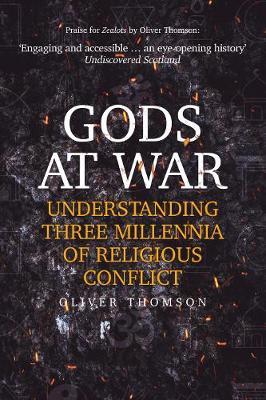Gods at War

Gods at War
Oliver Thomson assesses the level of religious involvement in wars, including less obvious ones such as the attempted invasion of the Spanish Armada, the French Revolutionary Wars, and the Japanese War in the Pacific; the prime minister of Japan who launched the attack on Pearl Harbor was a devout Buddhist. There are examples of wars inspired by Judaism, rival Christian and Muslim sects, Sikhism and Japanese Shinto.
The first section of the book discusses several different types of religious influence in conflicts, ranging from almost purely religious wars like the French or German wars of religion, to the many others where religion only played a supportive but still significant role. It also explores the reasons why religious sanction has been welcomed by war leaders and why religions chose to cooperate. Distinctions are drawn between the documented faith of each religion and its manipulation by its leaders when it suited them.
Four main sections cover wars from the pre-Christian era, the Middle Ages, the early modern period and finally the conflicts of the twenty-first century, including the use made of the Russian church by Vladimir Putin, of Sunni Islam by Mohammed bin Salman - even of Pentecostalism in Guatemala.
PRP: 144.00 Lei
Acesta este Prețul Recomandat de Producător. Prețul de vânzare al produsului este afișat mai jos.
115.20Lei
115.20Lei
144.00 LeiLivrare in 2-4 saptamani
Descrierea produsului
Oliver Thomson assesses the level of religious involvement in wars, including less obvious ones such as the attempted invasion of the Spanish Armada, the French Revolutionary Wars, and the Japanese War in the Pacific; the prime minister of Japan who launched the attack on Pearl Harbor was a devout Buddhist. There are examples of wars inspired by Judaism, rival Christian and Muslim sects, Sikhism and Japanese Shinto.
The first section of the book discusses several different types of religious influence in conflicts, ranging from almost purely religious wars like the French or German wars of religion, to the many others where religion only played a supportive but still significant role. It also explores the reasons why religious sanction has been welcomed by war leaders and why religions chose to cooperate. Distinctions are drawn between the documented faith of each religion and its manipulation by its leaders when it suited them.
Four main sections cover wars from the pre-Christian era, the Middle Ages, the early modern period and finally the conflicts of the twenty-first century, including the use made of the Russian church by Vladimir Putin, of Sunni Islam by Mohammed bin Salman - even of Pentecostalism in Guatemala.
Detaliile produsului









